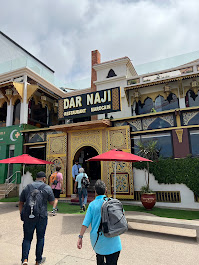Merci

Culture is important, and it helps define who we are. There are many different cultures, but everyone has their own. One cultural identity I have noticed is that many Moroccans have accepted some ways of the French especially when adopting their language. Many Moroccans speak French as one of their many languages because it is still being taught in schools. In the schools back home, Spanish and French are offered, but most students only have to take a foreign language for two to three years and maybe in college. Some people lose the way of the language if they do not use it often. However, many people in Morocco speak many languages such as Arabic, French, Spanish, English, etc. Furthermore, when we were eating lunch at Dar Naji, we had a younger server. Derek was trying to be kind, and telling the server “Merci” which means ‘thank you’ in French when he would place food on the table or got plates out of our way. After about the third time the server had asked Derek to stop s...





